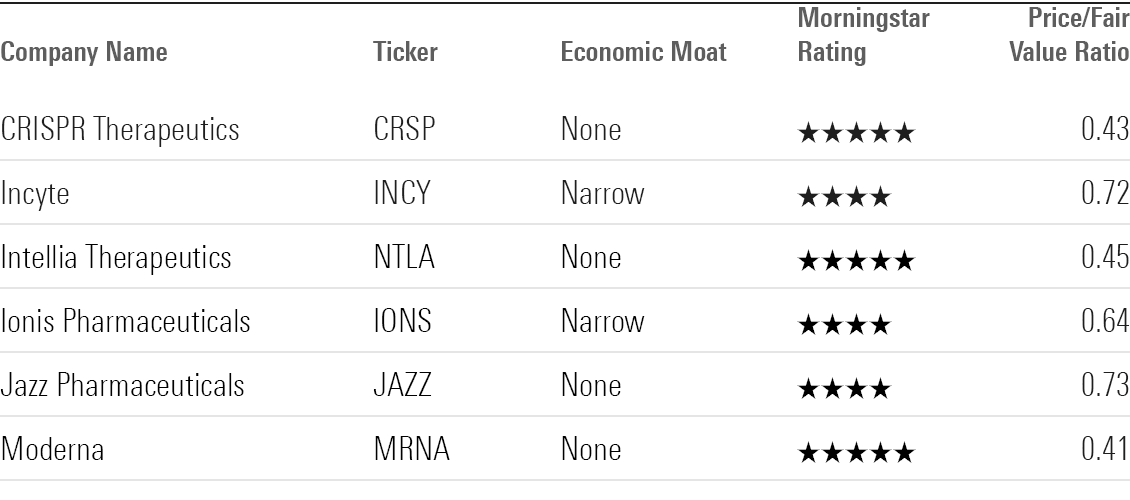6 Undervalued Biotech Stocks
These stocks from the Morningstar US Biotechnology Index look cheap.

With biotech stocks lagging behind the broader stock market this year, several recognizable names are down in discount territory.
That includes big names such as Moderna MRNA—well-known for its coronavirus vaccine—and gene-editing giant CRISPR Therapeutics CRSP.
To look for undervalued biotechnology stocks, we turned to the Morningstar US Biotechnology Index, which tracks the stocks of companies that operate in the biotechnology industry in the United States.
The biotechnology index gained 5.80% for the trailing 12-month period as of Sept. 7, while U.S. stocks gained 15.74%, as measured by the Morningstar US Market Index. Biotech is known to be a risky area for investors. “Biotech is very speculative,” says Rachel Elfman, healthcare equity analyst at Morningstar. While successful drugs can bring in billions in revenue, success is far from guaranteed. Fortunes can rise or fall based on a single up or down decision from the U.S. Food and Drug Administration regarding a biotech company’s main product.
Morningstar US Biotech Market
What Are Biotechnology Stocks?
Biotech and biopharmaceutical companies are engaged in research, discovery, development, and production of innovative drug and drug-related technologies. Regeneron Pharmaceuticals REGN, Vertex Pharmaceuticals VRTX, and Alnylam Pharmaceuticals ALNY are among the largest companies in the Morningstar US Biotechnology Index.
6 High-Quality Undervalued Biotechnology Stocks
We looked for the most undervalued stocks in the US Biotechnology Index that currently carry a Morningstar Rating of 4 or 5 stars.
Only two of the most undervalued stocks earn a Morningstar Economic Moat rating, meaning they have durable competitive advantages that are expected to last for at least a decade.
For long-term investors, companies with wide or narrow Morningstar Economic Moat Ratings have historically had better odds of outperforming. Moat designations are hard to come by in the innovative, research-heavy biotech industry: only eight of the 43 stocks in the Morningstar US Biotechnology Index earn narrow moat ratings. Not a single stock in the index holds a wide economic moat. Within the biotech industry, Morningstar analysts often withhold moats until clinical trials or acquisitions are completed.
Of the 43 stocks in this index, these 6 are the most undervalued as of Sept. 7, 2023:
- CRISPR Therapeutics CRSP
- Incyte INCY
- Intellia Therapeutics NTLA
- Ionis Pharmaceuticals IONS
- Jazz Pharmaceuticals JAZZ
- Moderna MRNA
The most undervalued stock on the list is Moderna, trading at a 59% discount to its analyst-assessed fair value estimate as of Sept. 7. The least undervalued is Jazz Pharmaceuticals, trading at a 27% discount.
US Biotechnology

CRISPR Therapeutics
- Fair Value Estimate: $119.00
“CRISPR Therapeutics is a clinical-stage gene editing company focused on the development of CRISPR/Cas9-based therapeutics. The company’s proprietary platform specializes in Clustered Regularly Interspaced Short Palindromic Repeats (CRISPR)/Cas9, which precisely cuts DNA to disrupt, delete, correct, and insert genes to treat genetically defined diseases.
“CRISPR’s emerging technology has led to a new class of therapies, which are well suited for targeting rare diseases or other disorders that are caused by genetic mutations.
“We assign CRISPR Therapeutics a no-moat rating. We think the company has the funding and technological capabilities to potentially bring several of its pipeline programs to market. However, CRISPR Therapeutics currently has no approved drugs and a largely early-stage pipeline, so we refrain from awarding the company an economic moat. We see a very high level of uncertainty related to regulatory approvals for the company’s early-stage portfolio and a range of potential outcomes.”
—Rachel Elfman, Analyst
Incyte
- Fair Value Estimate: $88.00
“Incyte has built a solid foundation over the past decade with hematology drug Jakafi, and the approval of the same active ingredient as oral dermatology drug Opzelura is expanding the firm’s focus to new therapeutic areas. We think the strategy to find more effective combination therapies in hematology and build a larger oncology and dermatology portfolio is solid, although we’re waiting for key data before assuming the firm can grow through Jakafi’s patent expiration in 2028.”
“Intangible assets around the core Jakafi franchise remain the foundation of Incyte’s narrow moat, although additional drug approvals have begun to offer more support and diversification, which helps defend the moat against future patent expirations. While we expect Jakafi patent loss in 2028, we still see returns on invested capital north of 15% through most of our 10-year forecast period, due to a portfolio of other products with significant expected sales over the next decade and royalty streams from collaborators on additional Incyte-discovered drugs.”
—Karen Andersen, Analyst
Intellia Therapeutics
- Fair Value Estimate: $85.00
“Intellia Therapeutics is a gene editing company focused on the development of CRISPR/Cas9-based therapeutics. Intellia’s technology platform specializes in Clustered Regularly Interspaced Short Palindromic Repeats (CRISPR)/Cas9, which precisely cuts DNA to disrupt, delete, correct, and insert genes to treat genetically defined diseases. CRISPR/Cas9 has created a new class of medicines, which are well suited for targeting rare diseases or other disorders that are caused by genetic mutations.”
“We assign Intellia Therapeutics a no-moat rating. We think the company’s proprietary technology has the potential to build blockbusters in rare diseases. Intellia is focused on developing and commercializing novel therapies to treat severe, genetic diseases and currently possesses a sizable, yet mostly early-stage pipeline. We think the company has the funding and technological capabilities to potentially bring several of its pipeline programs to market. However, we see a very high level of uncertainty related to regulatory approvals for the company’s early-stage portfolio and a range of potential outcomes.”
—Rachel Elfman, Analyst
Ionis Pharmaceuticals
- Fair Value Estimate: $62.00
“Ionis is a leader in RNA-based therapies, and its spinal muscular atrophy drug Spinraza, marketed by partner Biogen, is the first RNA-based therapy to achieve blockbuster status. The firm’s antisense oligonucleotide, or ASO, technology faces strong competition from RNA interference technology emerging from Alnylam, Arrowhead ARWR, and Novo Nordisk (Dicerna) NVO, as well as gene editing and gene therapy pipelines at multiple firms. However, Ionis has built a massive pipeline of promising new drugs that are rapidly moving toward the market, securing a narrow moat.”
“Ionis has proprietary ASO technology that has led to four approved RNA-based drugs and a steadily growing pipeline, which together support the firm’s intangible assets and narrow economic moat.”
—Karen Andersen, Analyst
Jazz Pharmaceuticals
- Fair Value Estimate $187.00
“Jazz Pharmaceuticals added its leading drug, Xyrem, to its portfolio in 2005 with the acquisition of Orphan Medical for about $123 million. This was a great price for the then-newly approved drug, which became a blockbuster. At that point, Xyrem was the only approved treatment for cataplexy (sudden muscle weakness or paralysis) in narcolepsy; it has since garnered additional approvals for excessive daytime sleepiness in patients with narcolepsy. Its strong efficacy has propelled its success in the difficult-to-treat sleep indication, but generic entry is on the horizon, leaving a cloud of uncertainty for the company. Jazz reached a settlement in 2017 with Hikma Pharmaceuticals to not allow generics on the market until January 2023. While Jazz will retain some economic profit from royalties on generic sales and a shared distribution program, we expect its returns to decline following Xyrem’s generic entry.”
“We do not believe Jazz possesses an economic moat, given its reliance on its oldest drug, Xyrem for narcolepsy, which accounted for 74% of 2020 revenue. We expect Xyrem’s sales will significantly weaken in 2023 and continue to be damped throughout our explicit forecast period.”
—Rachel Elfman, Analyst
Moderna
- Fair Value Estimate: $266.00
“Moderna’s mRNA technology has gained rapid validation as sales of its COVID-19 vaccine soared in 2021, but we think the firm has yet to secure a narrow economic moat around its business, largely owing to uncertainties tied to an evolving virus and the changing competitive landscape for innovative vaccines.
“In a record-breaking span of just 11 months, Moderna created, developed, manufactured, and got regulatory authorization for mRNA-1273, a two-dose COVID-19 vaccine that is one of the first two mRNA vaccines ever authorized (alongside Pfizer/BioNTech’s BNT162b2). The pandemic accelerated Moderna’s evolution into a commercial-stage biotech, and we expect that the firm’s ramp-up in manufacturing and clinical know-how will pave the way for faster timelines for additional programs. Moderna’s mRNA platform, involving rapid design and similar manufacturing across programs, allows the company to pursue multiple programs in parallel. Moderna also retains full rights to most of its programs, although partnerships with Merck and Vertex help support its efforts in oncology and cystic fibrosis.
“The stellar safety and efficacy profile of Moderna’s COVID-19 vaccine has rapidly validated the firm’s mRNA technology, and we expect returns on invested capital to remain above our 9% assumed cost of capital beginning in 2025. However, we see threats of major value destruction that preclude us from awarding a narrow moat rating to the firm. Moderna is already serving a critical role in vaccinating millions of individuals during the pandemic and has several potential first-in-class vaccines in testing that could serve significant unmet needs. We think the firm is still in the process of building a moat, as we expect multiple new competitors will be entering the vaccine market during the endemic phase.”
—Karen Andersen, Analyst
The author or authors do not own shares in any securities mentioned in this article. Find out about Morningstar’s editorial policies.


/cloudfront-us-east-1.images.arcpublishing.com/morningstar/OBA7UVI75RGFDOHGJTZ2FK542Q.jpg)
/cloudfront-us-east-1.images.arcpublishing.com/morningstar/FLTYESKF5FHATMSB2T2B7QVUYI.png)
/d10o6nnig0wrdw.cloudfront.net/06-24-2024/t_02e621614b3b42078e17000bf20c9bf2_name_file_960x540_1600_v4_.jpg)